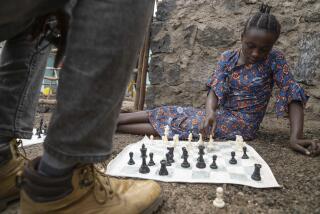Beersheba Masters Kings, Knights, Pawns
- Share via
BEERSHEBA, Israel — Here’s a surprise gambit: the city with the most chess grand masters per capita in the world is Beersheba.
Better known as a biblical oasis or, in its later reincarnation, a desert backwater, Beersheba is trading its image of squalid housing projects and camels for castles and kings.
“For every 20,000 inhabitants, we have a grand master,” said Beersheba chess club founder Eliyahu Levant, referring to the eight club members who have achieved chess’ highest ranking.
Actually, it’s a ratio of one grand master per 22,875 residents in this city of 183,000. That’s still impressive compared to traditional chess centers in Russia, like Moscow with one out of every 170,000 people, or St. Petersburg with one per 215,000, according to Russian Chess Federation figures.
There are 1,000 or so grand masters worldwide, said Almog Burstein, Israeli representative to the World Chess Federation.
Beersheba has become a leading team in European club competition, said Vitali Golod, 33, one of the club’s grand masters. Golod said the club’s reputation attracted top players to the city. “Beersheba has a culture of chess,” he said.
But it was not always so.
By all accounts, it is Levant, 76, who is responsible for chess taking root in these arid surroundings. A former Soviet chess official and Leningrad Spartak chess club coach, he was one of about 140,000 Soviet Jews allowed to migrate to Israel in the early 1970s during a brief thaw in Kremlin policy, which otherwise barred Jews from leaving.
Arriving in Israel in 1973, Levant surprised Israel’s chess community by turning down a position at the Tel Aviv chess club and announcing that he was going to Beersheba. “They didn’t understand who I was, a new immigrant with not a word of Hebrew, turning down a job and going off to Beersheba,” he said.
What the chess officials did not know was that back in the Soviet Union, Levant was captivated by the vision of Israel’s founding father, David Ben Gurion, to turn sleepy Beersheba into the capital of the Negev desert. “I thought, in chess, this is a place where I can start from zero,” Levant said.
Levant traveled around city schools, playing simultaneous games against dozens at a time. In his first year, he played more than 2,000 students, he said, inviting those with potential to join the fledgling club.
In its early years, the club shared a small room with the local symphony orchestra, the ballet school and theater.
Now, in recognition of the club’s achievements, the city is renovating the current clubhouse, adding a second story.
“This is where we will have our competitions,” Levant said, pointing up past walls crammed with showcases housing dozens of trophies the club has won. The few open spaces on the walls are filled with black-and-white pictures of brooding former Israeli chess champions.
Under Levant’s tutelage, Beersheba has grown into the dominant force in Israeli chess, winning the national club championships 17 times since 1974. Levant has also helped boost Israeli chess to a ranking of sixth in the world -- behind Russia, Ukraine, Hungary, France and the United States -- with four players in the top 100, according to the World Chess Federation. Boris Avrukh, 26, ranked 92nd, is a member of the Beersheba club.
Levant says his club’s success comes from nurturing young talent. The focus on children is evident. Inside the club, the silence of deep concentration is frequently punctuated by the cries of the youngsters shouting “Is this it?” as they solve puzzles posed by their teacher, who exhorts them to think three moves ahead while asking them to take their feet off the tables.
“Parents send their children because they understand chess is a way to develop the thought process,” said Ilana David, 43, who coaches the youngsters, some as young as 4.
But the children stay because they’re having fun. “I like the challenge, all the action,” said Yonatan Hazan, 10.
Not all the talent is homegrown. Beersheba and Israeli chess received a huge boost with the fall of the Soviet Union, when more than 1 million people came to Israel in the 1990s from the traditional chess powerhouse. Many immigrants who played chess were drawn to Beersheba by Levant’s reputation.
“Beersheba is a well-known name,” said Michael Klenburg, 27, who came to Israel in 1994 from Lviv, Ukraine, and settled in Beersheba, where he plays competitively and teaches. He says the club’s success is all owed to Levant. “He was the right man at the right time,” he said.
But for Levant, his greatest achievement is not the trophies or internationally ranked players, but his contribution to the youth of the city. “All my students, every single one, went on to university,” he said proudly.
More to Read
Sign up for Essential California
The most important California stories and recommendations in your inbox every morning.
You may occasionally receive promotional content from the Los Angeles Times.













